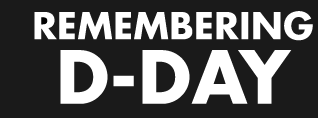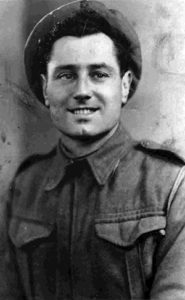We stood off Portsmouth for two or three days in a small New Zealand liner called the Monowai. Then the engines started up just after midnight and we were on our way at long last. My Beach Group was part of the 3rd Canadian Infantry Division.
About seven miles from JUNO beach we transferred onto smaller boats, mostly tank landing craft, and we were packed like sardines. I remember a Canadian soldier being hit by my side and going head first into the water as we left the boat. I can remember now – I stopped to shout at him that if he stayed like that he would drown, but of course he was dead. We ran ashore and dug a hole to get our breath and then started to help clear the beach and get things off the ships, such as ammunition, petrol and boxes of rations.
Those of us in the Beach Group wore white rings around our steel helmets to denote that we were working on the beach. I remember most of the morning being sniped at from a church tower. The sniper hit a fellow by me from the Liverpool Irish and medics took him to the Field Dressing Station. I remember him coming to speak to me full of morphine and the orderlies coming to look for him to get him back to the hospital ship.
Later that night the beach loudspeaker said, ‘Rest as much as you can, because the tide is too far out for any more ships to come in.’ I looked about for somewhere safe to lie down and found a place in the sand where a tank had come along. I lay down and watched the flash of shells and incendiaries overhead. I had been lying down for about half an hour when the loudspeaker came on again, saying that no-one should lie in tank tracks as two men had just been killed by late-moving vehicles. By this time D-Day was over and it was the start of another day.

